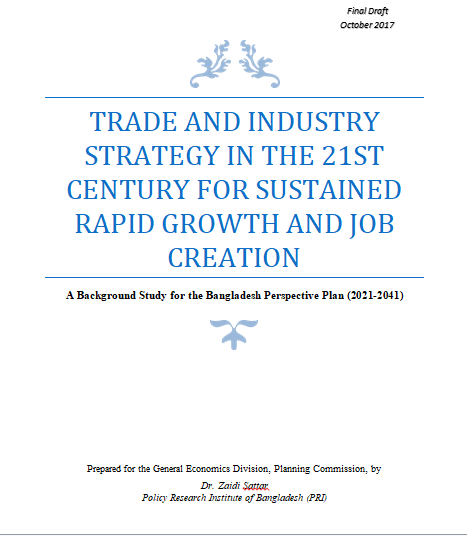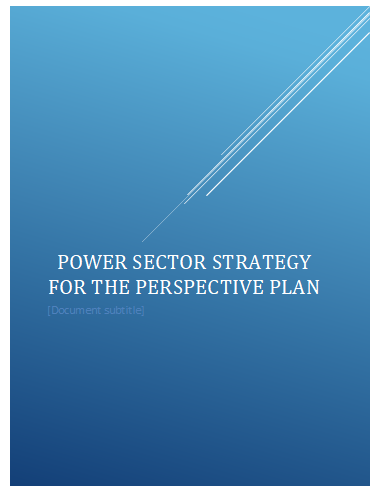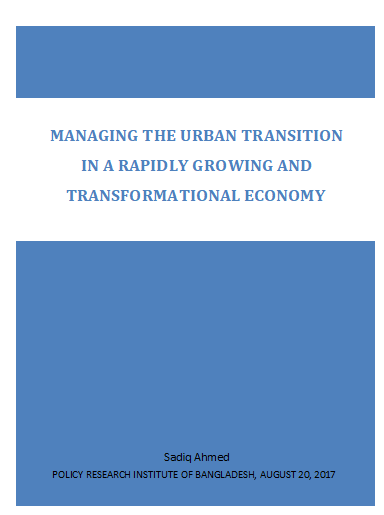Bangladesh has been on a transformation path with the manufacturing sector driving exports and job growth resulting in sustained robust average growth in both GDP and in per capita GDP, facilitated by some conducive policy reforms. From here on, the prospects of rapid growth with extensive job creation requires a high-performing and diversified manufacturing sector which will remain, for some time to come, the main driver of growth in Bangladesh.
Found 161 Results From


TRADE AND INDUSTRY STRATEGY IN THE 21ST CENTURY FOR SUSTAINED RAPID GROWTH AND JOB CREATION
 February 18, 2021
February 18, 2021 The global business community now recognizes Bangladesh as a nation of dynamic first generation industrial entrepreneurs who can compete with established players in the world market – export performance of readymade garments (RMG) is the classic example. Bangladesh has become a global powerhouse in low-cost manufacturing. But profound changes are taking place in the global economy. A fast-paced technological revolution, the digital age, is under way which will eventually change the way we live, work, and interact with the global community.

Power Sector Strategy for the Perspective Plan
 February 18, 2021
February 18, 2021 The objective of this study is to determine the medium-and long-term energy needs of Bangladesh, from which sources these growing demands are expected to be met, and what should be the strategy to ensure that supply of power grows in line with the demand without becoming a constraint to growth potential of the country.

Poverty Report Draft 30Dec17 v1
 February 18, 2021
February 18, 2021 The proposed new twenty-year Perspective Plan (2021-2041) of Bangladesh envisions that the country will achieve the status of an Upper-Middle-Income country by 2031 and, more ambitiously, of a High-Income country by 2041. As befitting such high ambitions, the Plan also proposes to make Bangladesh a practically poverty-free country by the end of the plan period. It is envisioned that extreme poverty will be completely eliminated by 2031 and moderate poverty would come down to the negligible level of no more than 5 percent by 2041.

PerspectivePlan-youth-women-children
 February 18, 2021
February 18, 2021 For the last few decades or so, Bangladesh has attained moderately high GDP growth with impressive progress in a number of socio-economic indicators. The country expects to graduate out of the LDC status by 2021 and aspires to reach the upper middle income status by 2030. After successful experiences of accomplishing a number of Millennium Development Goals, the country now aims at progressing towards attaining the Sustainable Development Goals, targeting towards elimination of poverty, reducing inequality and empowering the less privileged groups of people. The cornerstone of such an inclusive development strategy is a robust one of job creation through employment intensive growth which will absorb the army of additional workers that will enter the labour force due to the demographic transition of the country.

Paper 06_Global Trade_Selim Raihan_22052018
 February 18, 2021
February 18, 2021 Bangladesh economy’s impressive growth performance over the past two and half decades has raised hopes about the country’s graduation from the least developed country (LDC) status and its transition towards an upper middle income country in the near future. In 1990, in the global ranking of top gross domestic product (GDP) of countries (in PPP, constant 2011 US$), Bangladesh’s position was 50th. Impressively, by 2015, Bangladesh could improve its position in this ranking to 31st. According to the PWC projection, Bangladesh should become the 28th largest economy by 2030 and 23rd largest economy by 2050.

GED STUDY NO. 12 – TRANSPORTATION AND QUALITY INFRASTRUCTURE_FINAL (1)
 February 18, 2021
February 18, 2021 The transport sector plays an important role in the socio-economic development of Bangladesh. Bangladesh witnessed rapid growth of transport sector since independence. The overall annual growth rate was nearly 8.2 percent for freight transport and 8.4 percent for passenger transport. Even then the transport intensity of the Bangladesh is considerably lower than that of many comparable developing countries. The relative roles of transport modes are evolving with road transport expanding at the expense of railways and inland water transport because of its inherent technical and cost advantages.

Education Skills and Human Development 2041_Revised Final_ MMahmud
 February 18, 2021
February 18, 2021 Bangladesh government has embarked on a twenty years perspective plan 2021-2041 with the aim of achieving upper-middle income status by the year 2031 and higher middle income status country by the year 2046. The perspective plan sets its developmental goals with the view to eradicate extreme poverty, while attaining the status of upper middle status by 2031. It is assumed that past development achievements and favourable future growth prospects would make such goals towards realisation. However, the country faces many inherent development challenges that are documented in the national policy documents such as the 7th five year plan 2016-2020(SFYP 2015).

Background Paper on Health and Population Management_February 21 2018
 February 18, 2021
February 18, 2021 The Government of Bangladesh has placed utmost focus to integrate population management issues with healthcare system to ensure healthcare services for all. Initiatives have been taken to ensure availability, accessibility, affordability, and acceptability (4-As) of the health care system in Bangladesh. Consequently, Bangladesh has made remarkable progress in managing healthcare needs of its large population despite several resource constraints. However, there are several areas where greater attention is needed to ensure sustained human development in Bangladesh such as further improvement of maternal and child health, ensuring nutrition of mother and children, addressing youth and adolescent needs, and managing aging population. In this context, it is worthwhile to develop a long-term plan for ensuring quality health care and effective management of population along with identifying their challenges and generating implementation strategies.

2041 Background Paper_Climate_DrSaleem (Final-2018)
 February 18, 2021
February 18, 2021 The economic cost of climate change is most acutely felt in developing countries like Bangladesh, one of the world's densest nations and also one of the most vulnerable to climate change. Bangladesh has achieved recent gains in the area of economic growth (growing consistently by 6% since 1996) that could be halted due to climate change. However, a 2010 World Bank study in partnership with the Government of Bangladesh (GoB) finds that climate related disasters continue to result in large economic losses — reducing economic growth and slowing progress in reducing poverty. The report highlights that over the past decade, approximately 0.5 – 1% of GDP has been lost to damages in infrastructure, livelihoods, and from forgone production.

14. Managing the Urban Transition in a Rapidly Growing and Transformation Economy August 2017 v1
 February 18, 2021
February 18, 2021 Urbanization and development are highly and positively correlated. Cities lead the growth engine owing to high economic density ((value-added per unit of space) and proximity to the factors of production. It is no accident that high- and middle-income countries are more urbanised and their urban areas have higher economic densities than low-income countries (Figure 1). The correlation between urbanisation and GDP is indicative of the productivity advantage of urban areas.

02. RI Bangladesh 2041 Study Employment and Labour Market Policies for a Maturing Economy [2nd Draft – Final]
 February 18, 2021
February 18, 2021 The basic objective of the present study is to develop a long-term strategy for productive employment in Bangladesh within the framework of the Perspective Plan for 2041. The paper is presented in three broad parts. While Part 1 provides an overview of the employment and labour market situation in the country, Part 2 looks at the future and presents projections of employment. Part 3 is devoted to developing strategies and policies for employment.

01. Good governance, democratization, decentralization of power and capacity building [1st Draft]
 February 18, 2021
February 18, 2021 The Government of Bangladesh is in the process of formulating the Second Perspective Plan of Bangladesh (SPPB) covering the period 2021-2041. Bangladesh is at crossroads of its development journey. Bangladesh may by default continue on a relatively ‘low-level equilibrium growth path trap’ oscillating in a band between 7% annual growth on the high and 5% on the low. This will happen with continuation of current policies and institutions. Alternatively, Bangladesh could very well escape the ‘low-level equilibrium growth path trap’ and accelerate asymptotically towards a ‘higher-level equilibrium 10-11% annual growth path’ which will take it to a per capita income of $12,000 by 2041 as declared recently (June 20, 2017) by the honorable Prime Minister and possibly exceed $20,000 in 2050 both at today’s prices.

LDC Study Report
 February 18, 2021
February 18, 2021 Since independence, Bangladesh has climbed a long way up the development ladder. The progress measured in terms of income, poverty and human development is truly impressive. Development progress has been particularly rapid since 2009 under the dynamic leadership of Prime Minister Sheikh Hasina, particularly in terms of acceleration of GDP growth. Continuing on its path of growth hike, per capita income has risen to $1909 in FY 2019, which is over 20 times the per capita income at independence. In 2015, Bangladesh crossed the threshold of the World Bank-defined lower middle-income country (LMIC). In 2018 it also crossed the threshold for graduation from the UN-defined list of Least Developed Countries (LDC). The presumptive date for formal graduation out of LDC status is 01 January 2024, after going through the standard process of approval and announcement under the UN system.

National Sustainable Development Strategy (NSDS)
 February 18, 2021
February 18, 2021 The NSDS (2010-21) has identified five Strategic Priority Areas along with three cross-cutting areas with a view to achieving its stated vision and addressing long-term sustainability issue of critical areas. Key objective of the identified Strategic Priority Areas and sustainability of the critical areas which will be facilitated through the NSDS are given in this document.

National Policy Dialogues on Population Dynamics, Demographics Divident, Ageing Population & Capacity Building of GED 2013
 February 18, 2021
February 18, 2021 The objective of this paper is to identify how, in Bangladesh, the current population dynamics are affecting human development particularly in light of the post Millennium Development Goals (MDGs) and the Government of Bangladesh’s Sixth Five Year Plan. This policy dialogue with the key stakeholders will be helpful to identify the depth and dimension, strength and weakness of the past and current policies and program strategies. The dialogue is expected to enable the participants to see the current situation critically, identify the gaps in the existing policies and the problems in the implementation of the program. The paper deals with the relevant theories, policies and implementation status of the programs

MDG Financial Strategy 2011
 February 16, 2021
February 16, 2021 In Bangladesh, it is now recognized that MDGs may not be attained under a business as usual scenario. Additional interventions are needed to push forward the MDG agenda. Accordingly, the MDG Needs Assessment costs are derived for 7 clusters through five Thematic Working Groups (TWGs) under the aegis of the project “Support to Monitoring PRS and MDG in Bangladesh”. In line with convention, the MDG NA estimates are reported for 7 clusters under re-current and capital expenditure types.

GED Policy Study 2018
 February 16, 2021
February 16, 2021 In recent year, policy makers have highlighted the favorable age structure in Bangladesh while formulating medium and long term development plan. The Seventh Five Year Plan postulates that the demographic dividend along with the scope for expanding the participation of female labor force from its present low levels provides Bangladesh with a great opportunity to convert these factors to its advantage by focusing on labor skills. “In general, average labor productivity is low in Bangladesh and investment in skill formation will pay rich dividends in terms of growth acceleration by enhancing labor productivity. Similarly, increasing female participation in labor force will increase growth by expanding the supply of labor. Additionally, serious efforts are needed to upgrade the capacity to deliver technical and vocational education and skills training

Education Sector Strategy and Action for implementing of 7th Five Year Plan (2016-2020)
 February 16, 2021
February 16, 2021 The 7th Plan seeks to push further the ongoing structural transformation in Bangladesh. Accordingly, the manufacturing sector is targeted to achieve double digit growth while organized service sector is expected to further mature. GDP acceleration will be fuelled by increasing investment, rising from 29% in FY2015 to 34% by FY2020, and manufactured exports. Rural economy is projected to continue to undergo transformation as more non-farm activities emerge and the spread of ICT technology fosters knowledge and reduces the transaction costs. These structural changes along with GDP growth acceleration will continue to create more higher- income jobs that will not only be able to absorb the new entrants to the labor force but also reduce the employment share of agriculture. Higher productivity economy wide will contribute to higher real wages.

Population Management Issues Monograph 3
 February 16, 2021
February 16, 2021 The General Economics Division (GED), in cooperation with UNFPA, has conducted this study on sexual and reproductive health needs and budgetary implication in collaboration with the Bureau of Economic Research (BER), University of Dhaka. The study has given effort to find out information about Demographic transition and Potential of Demographic Dividend for Bangladesh, reproductive health scenario of Bangladesh, efforts and spending for RH services in the country and finally investment required for RH Services in Bangladesh to harness the demographic dividend.


